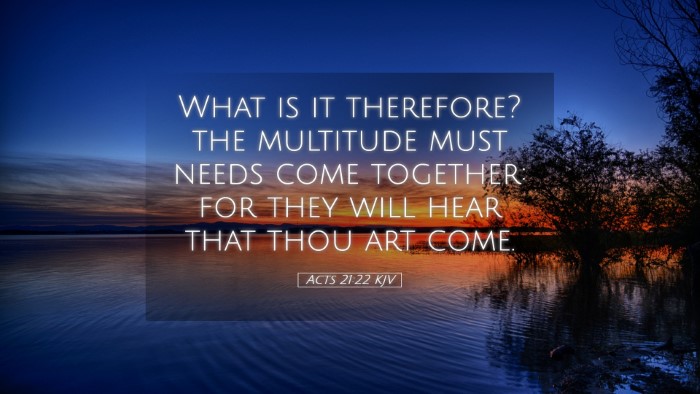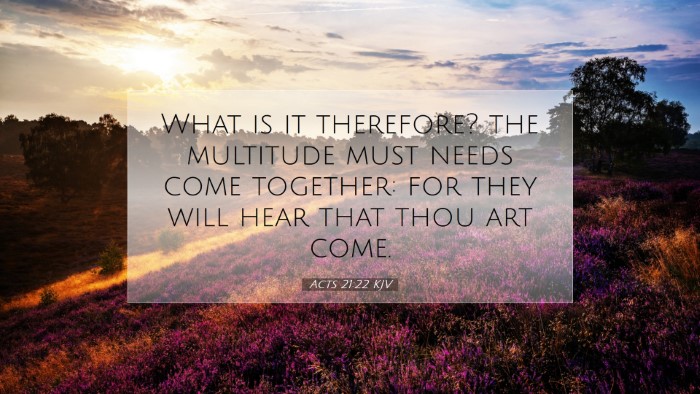Commentary on Acts 21:22
Verse Reference: Acts 21:22 - "What then is to be done? They will certainly hear that you have come."
Contextual Background
In order to fully grasp the significance of Acts 21:22, it is imperative to consider the broader context of Acts 21. The Apostle Paul, having returned to Jerusalem after his extensive missionary journeys, faces the delicate situation of reconciling his teachings with the expectations of the Jewish believers. The church in Jerusalem had been informed that Paul was teaching Jewish people living among the Gentiles to forsake the Law of Moses, which stirred up concern amongst the leadership.
Matthew Henry's Insights
Faithful Leadership: Matthew Henry emphasizes that the elders' response to Paul’s arrival shows their concern for the unity and harmony of the church. They urge Paul to demonstrate his adherence to the Jewish customs to quell any potential unrest. This event signifies the role of church leadership in managing both doctrinal truth and cultural sensitivity.
Unity of Believers: According to Henry, Paul’s willingness to participate in Jewish rites indicates a commendable desire for unity among believers. The elders recognize that Paul is not against the law but has a nuanced understanding of its fulfillment in Christ. The question “What then is to be done?” reflects the gravity of the situation and the necessity of a wise course of action.
Albert Barnes' Commentary
Response to Accusations: Albert Barnes elaborates on the situation wherein the Jewish Christians are suspicious of Paul's teachings. He underlines the importance of Paul’s actions in relation to the accusations leveled against him. The elders suggest practical means to demonstrate that Paul does not oppose Jewish customs, thereby seeking to maintain peace in the church and avoid escalating tensions.
Wisdom in Action: Barnes notes that the recommendation to perform purification rites not only serves to dispel rumors but also exemplifies wisdom in how to engage with differing cultural norms within the church. Paul’s compliance with this plan illustrates his adaptability and respect for the beliefs of others while still remaining committed to the core message of the Gospel.
Adam Clarke’s Observations
Paul's Intention: Adam Clarke interprets this verse as revealing Paul’s understanding of his mission. Clarke suggests that Paul was aware of the challenges that awaited him in Jerusalem but was committed to addressing the situation proactively. The elders’ question highlights the urgency of their concern for both Paul’s safety and the church’s unity.
The Role of Tradition: Clarke also emphasizes the tension between tradition and the new covenant brought about by Christ. He notes that the elders' suggestion to adhere to Jewish customs indicates a longing for cultural integrity, which poses a challenge for the doctrine of grace. This dilemma serves as a foundational issue for early believers as they navigate their faith in a diverse cultural landscape.
Theological Implications
Nature of the Church: Acts 21:22 raises significant questions about the nature of the church and its relationship to cultural practices. For theologians, it presents an opportunity to explore the balance between maintaining cultural identity and embracing the radical message of the Gospel. The tension between law and grace is highlighted here, particularly as Paul seeks to unite diverse groups within the body of Christ.
A Lesson in Unity: The recommendations made to Paul can be seen as a blueprint for modern church leaders navigating cultural divisions. The desire for unity, while remaining faithful to the teachings of Christ, is a challenge historically and contemporarily.
Pastoral Applications
Embracing Differences: Pastors are encouraged to draw lessons from this passage regarding the importance of understanding and engaging with different cultural practices within the church community. This understanding may require local adaptations and respect for traditional customs while guiding congregants towards a deeper relationship with Christ.
Guiding Through Conflict: Acts 21:22 serves as a reminder of the pastor’s role in guiding congregants through potential conflicts arising from cultural differences. It illustrates the necessity of addressing misunderstandings with wisdom and grace, echoing the counsel found in Proverbs, which speaks to the importance of wise counsel in managing relationships and disputes.
Conclusion
In examining Acts 21:22, we discern profound insights regarding the interplay between faith, culture, and community living. The verse encapsulates a critical moment in the early church, serving as a timeless reminder of the necessity for wisdom, sensitivity, and unity among diverse believers. It challenges pastors, students, theologians, and Bible scholars to engage thoughtfully with the complexities of cultural practices while upholding the truth of the Gospel.


